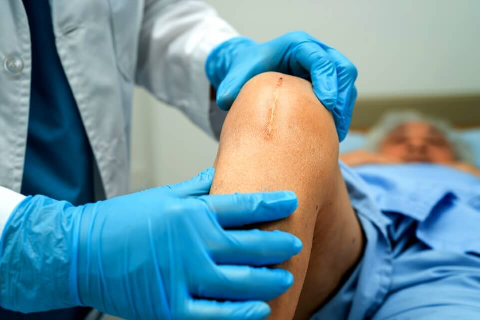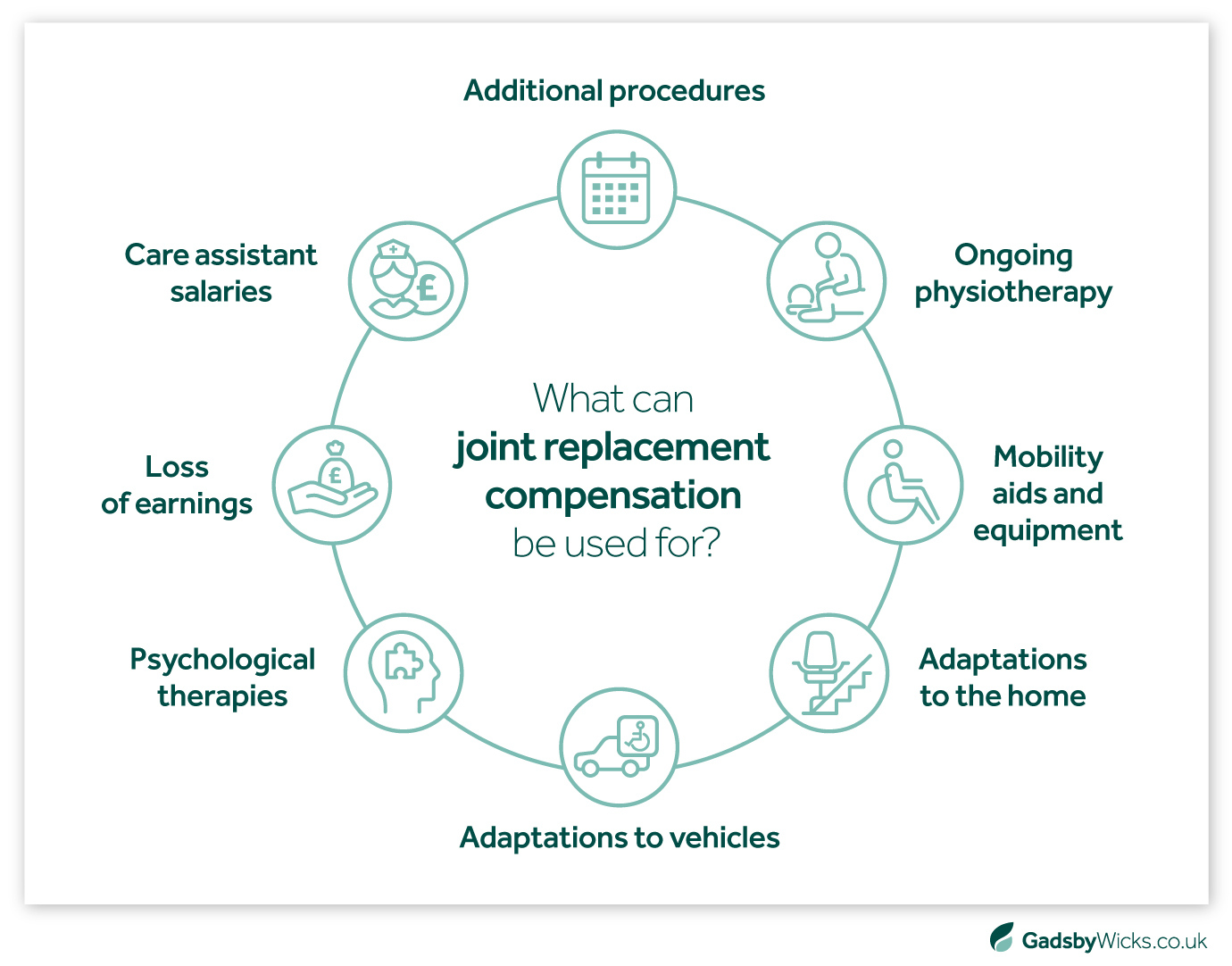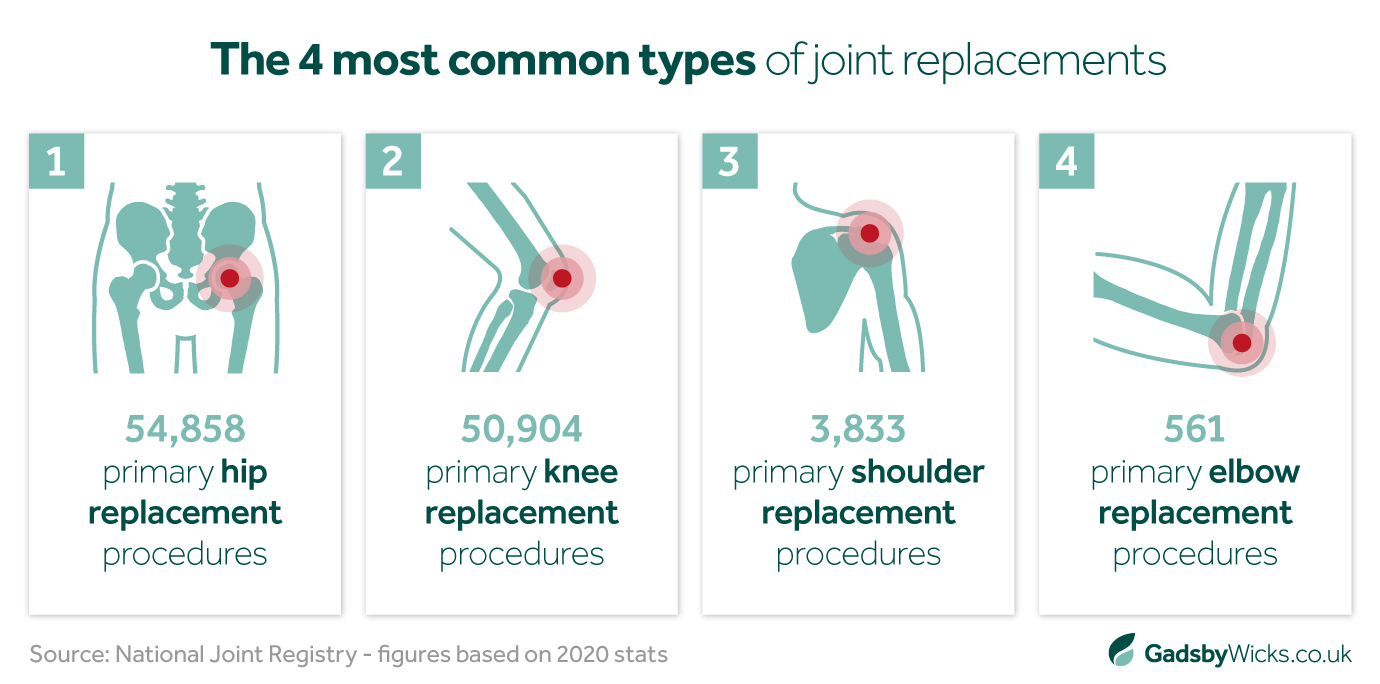- Home >
- Surgical Negligence Claims >
- Joint Surgery Claims
When avoidable mistakes occur during your joint surgery, we understand the debilitating impact this can have on your ongoing mobility and welfare, as well as the joint treatments you can access in the future.
If your life has been forever changed due to substandard care by your surgeon or another healthcare professional, our expert solicitors can help prove your joint surgery claim. With over three decades of clinical negligence experience and millions won in compensation – we are the team you can trust to achieve closure and lasting financial security.

Do you have a joint surgery claim?
While most joint operations are performed well, mistakes can and do happen. Because we rely on our joints for even the most basic actions, surgical errors affecting these areas can be especially devastating.
If your surgeon fitted the wrong prosthesis, damaged surrounding structures, or failed to act appropriately, and this caused you to suffer, you may have a right to justice. We are the firm you can rely on for help navigating the complexities of a joint surgery claim, securing vital support for your ongoing quality of life.

The specialist joint surgery claims solicitors for Essex & East Anglia
Since 1993, we have helped many claimants put things right following negligent joint surgery. Every year we win millions in compensation, giving our clients the closure and safeguards they need to move on – we can do the same for you.
By offering our legal services on a ‘no win, no fee’ basis, we ensure you can pursue the justice you deserve with no financial risk – you don’t pay a penny unless we win your case. Leaving no stone unturned and robustly negotiating on your behalf, trust our specialist solicitors to present the best case possible, with 96% of our cases resolved outside of court.
What does our joint surgery claims process look like?

A free initial consultation
Call us, request a callback or complete our online form and we’ll assess if you have a valid medical negligence claim.

Funding your claim
Discover the ways we can fund your claim without you paying a penny at any stage of the process.

Investigating evidence
We gather medical records, witness statements and more to learn what happened to you and prove your claim.

Instructing independent medical experts
We work with impartial, experienced medical experts to establish whether your injuries were due to substandard medical care.

Valuing your claim
We assess your health and financial losses to accurately estimate how much compensation your claim is worth.

Presenting your case
We contact the Defendants and the Courts on your behalf to set out your allegations and receive a response.

Negotiating a settlement
We work to achieve a fair settlement for you outside the courtroom – this is how 96% of our cases end.

Preparing for Trial
If we must proceed to Trial, we fully prepare you for what to expect so you receive the right result in court.
FAQs about joint surgery negligence claims
When is medical negligence to blame for joint surgery problems?
While the vast majority of joint surgeries are conducted to a good standard, and remedy the pain and suffering of a patient, mistakes do happen. Joint procedures can go wrong in numerous ways, whether it is due to a lapse in concentration or misinterpreting scans.
Damage to nerves and blood vessels
Surgeons must protect the nerves and blood vessels surrounding an operation site. If the nerves are stretched or damaged, or injury to the blood vessels is not addressed during or post-operation, it can cause serious issues. For example, if blood supply is restricted to nerves or muscles, they may die, causing long-term nerve damage and muscle wastage.
Using the wrong size prosthesis
If a prosthesis is fitted during a joint replacement surgery, it must fit well for a successful surgery. If the components are too large or too small, this can negatively affect a person’s wellbeing, movement and stability in the coming weeks, months and years.
For instance, if the artificial component used in a knee replacement is too small, it can limit how much the patient’s knee can bend, or cause pain. If it is too large, it can lead to instability, affecting someone’s balance and ability to move unaided.
There is a limit to the number of times a single joint can be replaced. This means that an error made by a surgeon which requires a revision to correct it can greatly alter someone’s long-term limb function and mobility.
If the prosthesis is faulty, and the surgeon was unaware of this, this is not a medical negligence claim, but a product liability claim.
Fitting the prosthesis incorrectly
If the angle at which a prosthesis is fitted is incorrect, this can also cause ongoing pain and problems with movement and stability. When a component is not positioned correctly or securely, it can gradually become loose and unstable. In severe cases, loose components can cause tissue damage, which may irritate and lead to infection and permanent mobility problems.
Infection
As is the case with any surgical procedure, open wounds and cuts can provide entry points for bacteria and viruses to enter the body. In addition, contaminants may also be transferred into the body via a prosthesis or artificial component.
Never events
A never event is when something entirely preventable occurs during surgery that has negative repercussions for the patient, including:
- Swabs or instruments being left inside the body
- Surgery being performed on the wrong part of the body
- The wrong type of blood is given during a blood transfusion
Other potential errors that can occur during joint surgery can include:
- Using too little or too much anaesthetic
- Removing too much or too little bone during an osteotomy
- Poor monitoring by medical professionals pre- and post-surgery
- Damage to tissues, cartilage, ligaments or veins

View our National and Essex Medical Negligence Statistics post for more industry insight.
How can joint replacement or surgery issues impact my life?
In the rare occasions where joint surgery goes wrong, it can have life-altering consequences. We rely on our joints for even the most routine actions so if their function is impeded by pain or a reduced range of motion, it can dramatically change how we approach each day.
The consequences could be relatively short-lived, such as requiring additional surgeries or treatments to resolve the problems caused by the first procedure. This may mean enduring pain for a longer period, or lead to a loss of earnings as you cannot work while your joints recover.
However, the problems caused by orthopaedic surgery may result in pain, instability and loss of mobility that affects you for the rest of your life. Having one or more of your joints be permanently damaged as a result of surgical complications can impact:
- Your ability to work, especially if it involves a lot of movement or manual labour
- Your ability to travel, either driving yourself or taking public transport
- Your ability to move around the home, particularly if you have multiple floors
Lasting damage to your joints can rob you of your independence and spontaneity, making you more dependent on others to help you navigate day-to-day life. In the most extreme cases, loss of blood flow to a limb caused by a mistake during surgery could mean it needs to be amputated. This will not only greatly restrict someone’s capabilities, but it also affects their self-image and psychological health.
What can joint replacement compensation be used for?
Compensation cannot take you back in time to before your surgery. But, it can help return you to the position you would be in had the surgery been successful or, where this is sadly not possible, improve your experience and quality of life following your injuries.

Both the value and how the compensation you receive is used will depend on how great an impact your injuries have had on your life. However, following successful joint surgery claims these can often include:
- Additional procedures
- Ongoing physiotherapy
- Mobility aids and equipment
- Adaptations to the home
- Adaptations to vehicles
- Psychological therapies
- Loss of earnings
- Care assistant salaries
If your life has been changed by the negligence of a surgeon or another healthcare professional, we work tirelessly on your behalf to ensure you receive the compensation you need to support you and your family’s future.
How do you prove a joint surgery negligence claim?
In all forms of clinical negligence, the onus is on the claimant to prove that a medical professional breached their duty of care, and that this was the direct cause of their pain, suffering and loss of amenity.
As specialist negligence solicitors, we will thoroughly investigate all available evidence associated with your claim, including:
- Medical records
- Claimant statements
- Witness statements
- Complaint correspondence
- Independent medical opinion
As part of our investigations, we will work with an impartial independent orthopaedic surgeon specialising in your affected area – shoulder, hip, knee, etc. Their insight and expertise are crucial to establish:
- Whether your surgeon or another healthcare professional breached their duty of care towards you
- Whether your surgeon’s actions or inactions directly caused the pain and suffering you experienced
- How your circumstances have changed, and what support you need moving forward
With this information, we will be able to determine whether you have a valid claim, and quantify the amount of compensation you are entitled to.
How long do joint surgery claims typically take to settle?
Every joint injury claim is unique, and we recognise it is important to treat each case as such. Therefore it is impossible to predict exactly how long these claims take to settle, in most cases, we would expect anywhere between two and five years.
This length of a claim will depend on several factors, including the stance taken by the Defendants and how long it takes to receive information from medical experts.
However, by working with a specialist medical negligence firm like Gadsby Wicks, you ensure that your claim is handled as efficiently as possible by people who know what they need to achieve the right result.
How long do I have to make a claim?
In most cases, you must make a joint surgery claim within three years of your injury being realised. However, there are exceptions:
- Children making a claim have until their 21st birthday
- There is no time limit for anyone who is mentally incapacitated
- If the claimant passes away within the three-year window, the three years start again from the date of death
The court also has discretion to allow claims to be brought out of time. Contact us today and we will be happy to discuss your situation.

Contact our expert joint surgery claims solicitors
If you or a loved one have experienced an injury during joint surgery or replacement and would like to speak to someone about your options, our team is here to listen and advise you on your next steps.

Lexcel accredited medical negligence claims solicitors
We are proud to be a Lexcel-accredited practice. The accreditation is a mark of quality and comes directly from the Law Society.
A recent assessment described us as a “Centre of Excellence” and we continue to operate to the highest standards across all main areas of our field. These include client care, case management, financial management, structure and strategy, people management, risk management, information management and file management.







